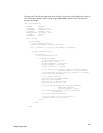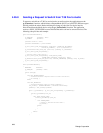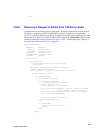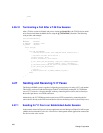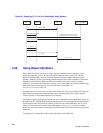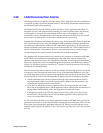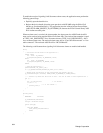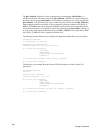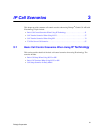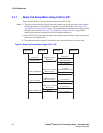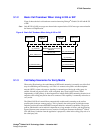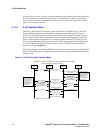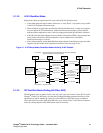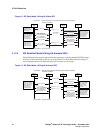335
Dialogic Corporation
print_alarm_info(&metaevent);
{
long alarm_number;
char *alarm_name;
unsigned long alarm_source_objectID;
char *alarm_source_object_name;
gc_AlarmNumber(metaeventp, &alarm_number);
// Will be of type TYPE_LAN_DISCONNECT = 0x01
// or TYPE_LAN_DISCONNECT + 0x10 (LAN connected).
gc_AlarmName(metaeventp, &alarm_name);
// Will be "Lan Cable Disconnected" or "Lan cable connected".
gc_AlarmSourceObjectID(metaeventp, &alarm_source_objectID);
// Will usually be = 7.
gc_AlarmSourceObjectName(metaeventp, &alarm_source_object_name)
// Will be "IPCCLIBAsoId"
printf("Alarm %s (0x%lx) occurred on ASO %s (%d)", alarm_name, alarm_number,
alarm_source_object_name, (int) alarm_source_objectID);
}
4.30 Setting Dialogic
®
IP Media Library Parameters
As a convenience to Global Call application developers, most Dialogic® IP Media Library API
parameters that are set via the IPM_PARM_INFO data structure can be set using a Dialogic
®
Global Call API call. (The only IP Media Library parameters which cannot be set from Global Call
are the three parameters for DTMF transfer mode and RFC2833 payload types.)
The IP Media Library settings that can be performed for a line device from Global Call include the
following:
• enabling/disabling echo cancellation
• specifying adaptive coefficients for echo cancellation
• specifying the echo tail length for echo cancellation
• adjusting audio volume level to or from the IP network
• specifying the type of service in IPv4 headers, either as a 7-bit TOS field or as a 6-bit DSCP
field for Differentiated Services (per RFC2474)
For more information on the IP Media Library parameters that can be set and the supported values
for those parameters, see the reference pages for the IPM_PARM_INFO data structure in the
Dialogic
®
IP Media Library API Library Reference.
To set an IP Media Library parameter for a line device from Global Call, the application first
constructs an IPM_PARM_INFO data structure that contains the desired parameter ID and value.
Then a parameter element containing the structure is inserted into a GC_PARM_BLK via the
gc_util_insert_parm_ref( ) function using the following IDs:
IPSET_CONFIG
IPPARM_IPMPARM
• Value = IPM_PARM_INFO data structure
The application then calls the gc_SetUserInfo( ) function to send the parameter block to the
ipm_SetParm( ) function on a pass-through basis (that is, without any validity checking on the
Global Call side).



